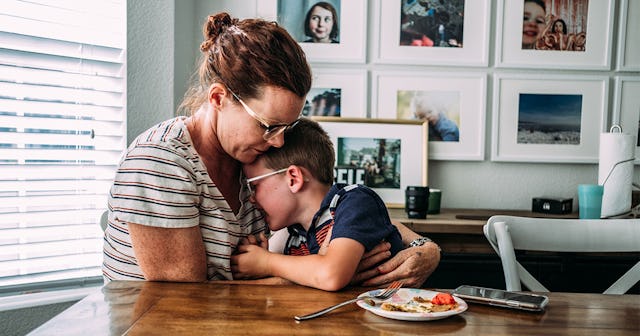Kids Are Not Our 'Emotional Gas Stations,' And We Need To Remember That

We have moved recently. My husband preceded the family to our new home and I was left to manage two kids, a dog, a PUPPY (see the grimace), pack a house, transfer my clients, and say goodbye to my closest family and friends. Cue the overwhelmed, head in the pillow, scream. Handling life, especially when it is complicated (like always), can be difficult. There were moments of crying from the sheer immensity of the task ahead.
Trying to navigate the world of emotions while parenting, can cause us to either stuff feelings or lean on our children for support. Neither are healthy for them or us. It is important for children to see emotions and notice positive coping skills. They do not need to live in a “safe” world where Mom and Dad are never frustrated, sad, anxious or angry. They also do not have shoulders big enough to help carry our burdens. How can we find a balance?
Communicate in an age-appropriate manner.
Johner Images/Getty
It is important to be honest with our children. They see more than we would like to admit and experience the atmosphere of our homes. Our faces tell them when we are having difficulty with our day or our situation. If they ask about our tears and we insist that nothing is wrong, we not only lie to them, we invalidate emotions in general.
It is important to give age appropriate responses. This could be saying, “I am really sad and I miss my friends back home” rather than “I am lonely because I do not have friends.” The simple version does not overwhelm little ones with the big emotions and does not give them a problem they need to “fix,” i.e., no friends. As kids get older, the words can be more complex, but it is vital to keep them from feeling as though they have to change your circumstances or make you feel better. This bleeds into the next point.
Model appropriate coping skills.
As I spilled the millionth item in my kitchen, I grunted in frustration and then took some deep breaths to avoid screaming or hitting my counter. You know who that impacted the most? My son. He was able to witness Mom using deep breathing to calm down just like she encourages him to do all the time.
It helps to call attention to the use of positive or negative coping. I admit, I yell at my kids sometimes. I hate that I do it. I do not want to do it. But it slips out. The fact that I yell is less impactful than the fact that I apologize. I tell my kids I am sorry and I reflect on the negative coping that I utilized. This helps to normalize the mistakes of negative coping and recognize that there are better methods to dealing with emotions.
Seek appropriate support.
Maskot/Getty
It can be tempting to utilize children as emotional gas stations. We are sad and need a hug? Ask a child. We need some affirmations? Ask a child. However, that is a manipulation of the parent/child relationship. They do not exist for our emotional fulfillment. When we begin to rely on them, we fail them as parents and we cease to be a healthy place for them.
We need to have others that we can rely on. A spouse is an important confidant. However, there needs to be at least one more. When you are fighting with your spouse? You need to have some you call. Ideally, it is someone that can remain objective, someone that has no ulterior motives and someone that can help be both encourager and devil’s advocate. Someone that is trustworthy. Complaining about your spouse to the coworker you secretly find attractive? Maybe not the best idea. Processing disagreements with a person that can provide sound counsel and keep things confidential? Much better.
It can be hard to find reciprocal relationships where support is provided. If you are in a more isolated stage and no one can be reached by phone? It is okay to use a professional. It is why mental health professionals are so helpful. Utilize someone who is trained to explore your difficult emotions, rather than using your child as that sounding board while they are still children.
Emotions are natural. Emotions are necessary. Recognizing emotions, and navigating them well, is a skill that we must impart as parents. When we are struggling, it can be so difficult to parent with healthy boundaries through that process. However, being able to see a parent struggle, cope and emerge on the other side of hard things, can set a child up for not only a stronger internal identity, but ensure they experience an atmosphere of stability.
This article was originally published on